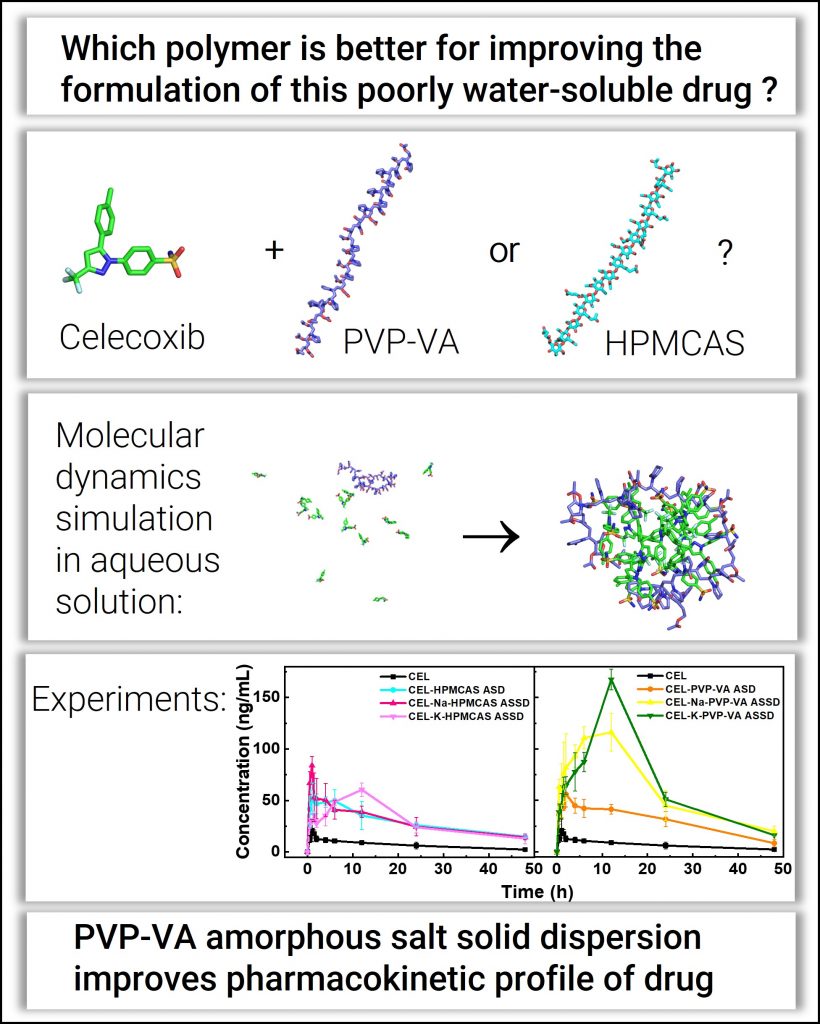Drug formulation: Help to find the right ingredients
The active ingredients of many medicines are poorly water-soluble and require suitable formulation to enable them to be orally administered and absorbed from the gastrointestinal tract. One approach to this problem is to add polymers. In this study, scientists at HITS and Heidelberg University, Germany, and NIPER, India, employed molecular simulation and experiments to identify an amorphous drug-polymer-salt solid dispersion of the widely used anti-inflammatory, celecoxib, that has excellent biopharmaceutical performance.
The selection of polymers for the formulation of drugs is classically done by trial-and-error or the application of classical empirical models. In the case of celecoxib and the two polymers, polyvinylpyrrolidone vinyl acetate (PVP-VA) and hydroxypropyl methylcellulose acetate succinate (HPMCAS), these models did not correctly rank the polymers. With advances in molecular simulation methods and computer hardware, atomistic molecular dynamics simulations of systems of drug molecules and polymers in aqueous solution are becoming feasible. The team therefore carried out molecular dynamics simulations and found that the computed strength of drug-polymer interactions correlates with the dissolution and pharmacokinetic profiles of amorphous drug-polymer-salt systems (see Figure).
Moreover, the researchers found that the celecoxib-salt-PVP-VA formulation is stable and highly bioavailable. This case study points the way to molecular dynamics simulation-driven selection of polymer excipients for the formulation of a wide range of poorly water-soluble drugs. The experiments in this interdisciplinary study were carried out by pharmaceutical chemists at the Indian National Institute of Pharmaceutical Education and Research (NIPER SAS Nagar), the foremost pharmaceutical research institute in India.
The molecular simulations were done by computational chemists and biophysicists at the Heidelberg Institute for Theoretical Studies (HITS) and Heidelberg University. ”This study shows how molecular simulations can help to understand drug-polymer interactions and thereby achieve significantly improved drug formulation with the potential for lower and less frequent doses, and fewer side-effects” says Rebecca Wade from HITS and Heidelberg University.
The study has received funding from the German Federal Ministry for Education and Research (BMBF; grant 01DQ19004), the Klaus Tschira Foundation, and the Department of Biotechnology, New Delhi, (BT/IN/BMBF-BioHR/34/ATS/2018-19). Computing resources provided by Baden-Württemberg bwHPC and the German Research Foundation (DFG) (grant INST 35/1134-1 FUGG) were used.
Publication: Mukesh, S., Mukherjee, G., Singh, R., Steenbuck, N., Demidova, C., Joshi, P., Sangamwar, A.T., Wade, R.C. Comparative analysis of drug-salt-polymer interactions by experiment and molecular simulation improves biopharmaceutical performance. Commun Chem 6, 201 (2023). https://doi.org/10.1038/s42004-023-01006-0
Scientific contacts:
Prof. Dr. Rebecca Wade
Molecular and Cellular Modeling group
Heidelberg Institute for Theoretical Studies (HITS)
Phone: +49 6221 533 245
rebecca.wade@h-its.org
Prof. Abhay T. Sangamwar
Department of Pharmaceutics
National Institute of Pharmaceutical Education and Research (NIPER)
S.A.S. Nagar, Punjab, India
abhays@niper.ac.in
Media contact:
Dr. Peter Saueressig
Head of Communications
Heidelberg Institute for Theoretical Studies (HITS)
Phone: +49 6221 533 245
peter.saueressig@h-its.org
About HITS
HITS, the Heidelberg Institute for Theoretical Studies, was established in 2010 by physicist and SAP co-founder Klaus Tschira (1940-2015) and the Klaus Tschira Foundation as a private, non-profit research institute. HITS conducts basic research in the natural, mathematical, and computer sciences. Major research directions include complex simulations across scales, making sense of data, and enabling science via computational research. Application areas range from molecular biology to astrophysics. An essential characteristic of the Institute is interdisciplinarity, implemented in numerous cross-group and cross-disciplinary projects. The base funding of HITS is provided by the Klaus Tschira Foundation.
